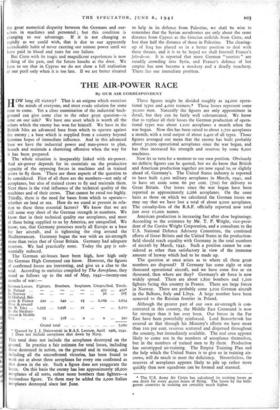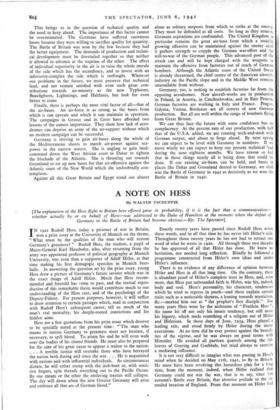THE AIR-POWER RACE
By OUR AIR CORRESPONDENT
HOW long till victory? That is an enigma which exercises the minds of everyone, and must evade solution for some time to come. Yet a close examination of the industrial back- ground can give some clue to the other great question—is time on our side? We have one asset which is worth all the others which the enemy has won for hiniself. We have in the British Isles an advanced base from which to operate against the enemy ; a base which is supplied from a country beyond German hopes of immediate influence. And in this advanced base we have the industrial power and man-power to plan, launch and maintain a shattering offensive when the way for it has been prepared.
The whole situation is inseparably linked with air-power. And air-power depends for its essentials on the productive capacity of the opposing forces in machines and in trained crews to fly them. 'There are three aspects of the question to be considered. First of all there are the numbers—not only of aeroplanes, but also of trained crews to fly and maintain them. Next there is the vital influence of the technical quality of the machines and of their crews. That cannot be rated too highly. Thirdly, there is the need for bases from which to operate— whether on land or sea. How do we stand at present in rela- tion to these three essential factors? We know that we are still some way short of the German strength in numbers. We know, that in their technical quality our aeroplanes, and most of those being supplied to us by America, are unequalled. We know, too, that Germany possesses nearly all Europe as a base for her aircraft, and is tightening the ring around the Mediterranean. Germany began the war with an air-strength more than twice that of Great Britain. Germany had adequate reserves. We had practically none. Today the gap is sub- stantially reduced. The German air-losses have been high, how high only the German High Command can know. However, the figures of confirmed .losses are interesting, and give us a clue to the total. According to statistics compiled by The Aeroplane, they stand as follows up to the end of May, 1941—twenty-one months of war :—
German Losses. Fighters. Bombers. Seaplanes. Unspecified. Totals.
In Poland ... — ... — ...
— ... 450
450*
In Norway ...
56 56-1.
In Holland, Bel-
gium & France 220
... 240 ...
25 ... 2,169 ... 2,654 Over & around the B. Isles ... 1,553
•••
1,936 • •
• 21 -
3,510
In the Mediter- ranean & Middle
East
72 ... 318 ...
0
• • •
390
Grand total ... 7,060
* Quoted by J. J. Dziewonski in R.A.S. Lecture, April 19th, 1940.
t. Does not include aeroplanes shot down by Navy.
This total does not include the aeroplanes destroyed on the ground. In practice a fair estimate for total losses, including those destroyed in action, on the ground and in training, and including all the unconfirmed victories, has been found to work out at about three aeroplanes for every one confirmed as shot down in the air. Such a figure does not exaggerate the losses. On this basis the enemy has lost approximately 28,000 aeroplanes of all sorts, rather more bombers than fighters—a tremendous figure. To them may be added the 2,000 Italian aeroplanes destroyed since last June. Those figures might be divided roughly as 24,00o opera- tional types and 4,000 trainers.* Those losses represent some 50,0oo men. Naturally the figures are only approximate in detail, but they can be fairly well substantiated. We know that to replace all their losses the German production of opera- tional types was about ',too aeroplanes a month when the war began. Now this has been raised to about 1,700 aeroplanes a month, with a total output of about 2,400 of all types. Those figures averaged out mean that the enemy has built probably about 30,000 operational aeroplanes since the war began, and has thus increased his strength and reserves by some 6,000 machines.
Now let us turn for a moment to our own position. Obviously no definite figures can be quoted, but we do know that British and American production together are now equal to, or slightly ahead of, Germany's. The United States industry is reported to have built 1,200 military aeroplanes in March, 1941, and to have set aside some 6o per cent. (700) for delivery to Great. Britain. Our losses since the war began have been reported as approximately 2,266 aeroplanes. On the same basis as those on which we calculated the German losses we may say that we have lost a total of about 9,000 aeroplanes. The casualty-lists of the R.A.F. officially reported now total just over x i,000 names.
American production is increasing fast after slow beginnings. According to the estimates by Mr. T. P. Wright, vice-presi- dent of the Curtiss Wright Corporation, and a consultant to the U.S. National Defence Advisory Committee, the combined efforts of Great Britain and the United States in the production- field should reach equality with Germany in the total numbers of aircraft by March, 1942. Such a position cannot be con- sidered as other than satisfactory in view of the immense amount of leeway which had to be made up.
The question at once arises as to where all these great numbers are disposed? If Germany has some eight or nine thousand operational aircraft, and we have some five or six thousand, then where are they? Germany's air force is now widely spread. There are about 1,800 bombers and 1,200 fighters facing this country in France. There are large forces in Norway. There are probably some 3,000 German aircraft in the Balkans, Italy and Libya. A large number have been removed to the Russian frontier in Poland.
Although the greater part of our own air-strength is con- centrated in this country, the Middle East Command is now far stronger than it has ever been. Our forces in the Far East have been powerfully reinforced. Lord Beaverbrook has assured us that through his Ministry's efforts we have more than too per cent. reserves scattered and dispersed throughout. the country, but immediately available. The real crux appears likely to come not in the numbers of aeroplanes themselves, but in the numbers of trained men to fly them. Production has outstripped air-training. The Empire Training Plan and the help which the United States is to give us in training air- crews, will do much to meet the deficiency. Nevertheless, the reserves of aeroplanes appears likely to pile up rather more quickly than new squadrons can be formed and manned.
* The U.S. Army Air Corps has calculated its training losses as one death for every 4cIpoo hours of flying. The losses by the belli- gerent countries in training are certainly much higher. That brings us to the question of technical quality and the need to keep ahead. The importance of this factor cannot be overestimated. The Germans have suffered enormous losses because they were willing to sacrifice quality for quantity. The Battle of Britain was won by the few because they had the better equipment. The demands of production and techni- cal development must be dovetailed together so that neither is allowed to advance at the expense of the other. The effect of individual superiority in the air is to raise the whole morale of the side which has the ascendency, and to invest with an inferiority-complex the side which is outfought. Whatever our problems in the future, we must preserve that technical lead, and not remain satisfied with even such great con- tributions towards air-mastery as the new Typhoons, Beaufighters, Lightnings, and Halifaxes, but look for even better to come.
Finally, there is perhaps the most vital factor of all—that of the air-bases. An air-force is as strong as the bases from which it can operate and which it can maintain in operation. The campaigns in Greece and in Crete have afforded two lessons of the utmost importance. They show how lack of aero- dromes can deprive an army of the air-support without which no modern campaign can be successful.
Germany is striving to gain air-bases along the whole of the Mediterranean shores to match air-power against sea- power in the narrow waters. She is angling to gain land- command down the West African coast to Dakar to tighten the blockade of the Atlantic. She is thrusting out towards Greenland to set up new bases for that air-offensive against the Atlantic coast of the New World which she undoubtedly con- templates.
Against all this Great Britain and Egypt stand out almost alone as solitary outposts from which to strike at the enemy. They must be defended at all costs. So long as they remain, Germans aspirations are confounded. The United Kingdom in particular remains the great air-base from which a steadily growing offensive can be maintained against the enemy until it gathers strength to cripple the German war-effort and the will-to-war of the German people. This advanced post of the attack can and will be kept charged with the weapons to maintain the offensive from factories out of reach of German bombers. Although the Atlantic coast of the United States is already threatened, the chief centre of the American aircraft- industry on the Pacific slope and in the Middle West remains unassailable from without.
Germany, too, is seeking to establish factories far from the opposing aerodromes. New aircraft-works are in production in Poland, in Austria, in Czechoslovakia, and in East Prussia, German factories are working in Italy and France. Prague, Gdynia, Vienna, Bordeaux are all centres of new German production. But all are well within the range of bombers flying from Great Britain.
We can thus face 'the future with some confidence but no complacency. At the present rate of our production, with half that of the U.S.A. added, we are running neck-and-neck with German output, and about to forge ahead. By next spring we can expect to be level with Germany in numbers. If we move wisely we can expect to keep our present technical lead during the next eighteen months. We have reason to feel that in those things nearly all is being done that could he done. If our existing air-bases can be held, and bases in places like Dakar and Greenland denied to Germany, we shall win the Battle of Germany in 1942 as decisively as we won the Battle of Britain in 1940.



























 Previous page
Previous page